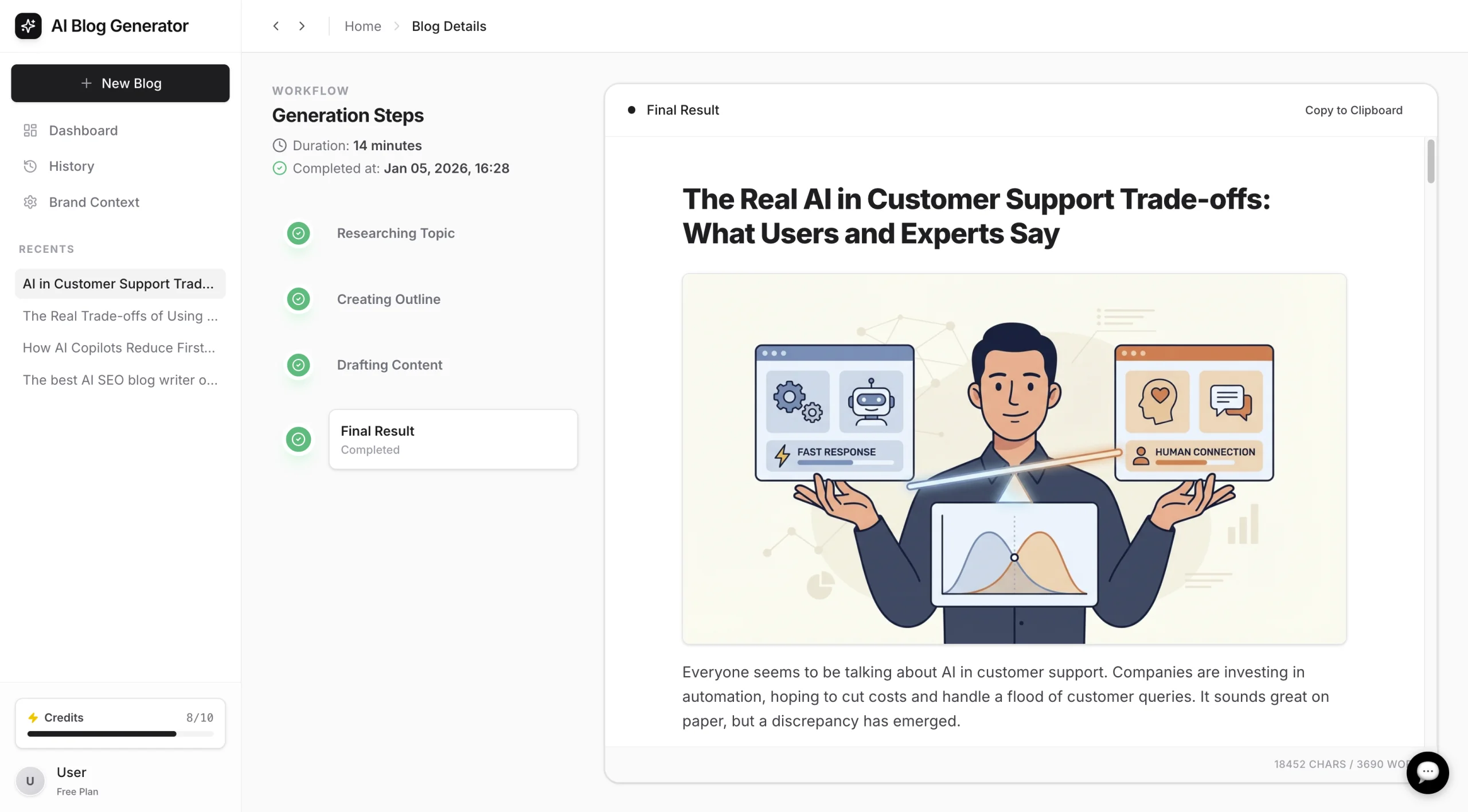
It feels like a new AI marketing tool launches frequently, each one claiming it will completely change how you work. This guide provides a practical look at AI tools we have direct experience with.
At eesel, we focused on scaling our content with AI, which resulted in growing from 700 to 750,000 daily impressions. That experience was a crash course in AI tools, allowing us to identify what works effectively.
Here is a guide to the 6 AI marketing tools I've personally used and can stand behind.
What are AI marketing tools?
AI marketing tools are software that uses artificial intelligence to assist with or automate marketing tasks.
These tools can assist with market research, create visuals from a simple prompt, prepare content for search engines (both traditional and AI-powered), manage social media schedules, and generate videos.
The purpose of these tools is to augment the capabilities of marketers. They handle repetitive tasks, freeing you up to focus on strategy and creative ideas. This allows you to scale your team's output without increasing headcount.
How we selected these AI marketing tools
To create a useful list, we tested each tool based on a few criteria:
-
Quality of Output: Does it create high-quality, usable content, or does it produce generic text that requires extensive rewriting?
-
Ease of Use: How intuitive is the tool? We selected tools that are easy to learn and use.
-
Real-World Impact: Does it solve a genuine marketing problem and contribute to goals like increasing traffic, generating leads, or accelerating content production?
-
Value for Money: Does the time it saves and the results it delivers justify its cost?
A comparison of top AI marketing tools
| Tool | Best For | Standout AI Feature | Starting Price |
|---|---|---|---|
| eesel AI blog writer | End-to-end SEO blog post creation | Generates complete, publish-ready posts with assets | Free to try, then $99 for 50 posts |
| Jasper | Advanced copywriting and brand consistency | Brand Voice & Knowledge Base integration | $59/month (billed annually) |
| ChatGPT | Research and rapid idea generation | Versatile conversational AI for any task | Free, with a $20/month Plus plan |
| Semrush | SEO and AI visibility tracking | AI Visibility Toolkit for answer engine tracking | $165.17/month (billed annually) |
| Canva | Quick visual content and design | Magic Studio for AI-powered design | Free, with a $120/year Pro plan |
| Synthesia | Scalable video creation | AI avatars and video translation in 140+ languages | $29/month |
A deep dive into six leading AI marketing tools
Here’s a closer look at the tools that made the list, including their primary functions and potential limitations.
1. eesel AI blog writer
The eesel AI blog writer is designed to address a common challenge in content marketing: turning a keyword into a publish-ready blog post quickly.
Unlike many AI writers that produce a rough draft, the eesel AI blog writer generates a complete article with a logical structure, headings, AI-generated images, tables, and relevant media like Reddit quotes and YouTube videos.

Its process includes context-aware research. For example, when creating a comparison post, it seeks out specific pricing information. For a how-to guide, it outlines clear steps. The content is designed for traditional SEO and for new AI Answer Engines (AEO), which is important for visibility in platforms like Google AI Overviews and Perplexity.
The tool produces content with a human-like tone. This is the tool we used for our own content strategy.
Limitation: It is a specialist tool designed for long-form content like blog posts and may not be suitable for short-form content like social media captions or ad copy.
You can try it for free to evaluate the quality of its output.
2. Jasper
Jasper is a well-known AI writing tool that excels at maintaining brand voice consistency across different types of content.
The Brand Voice feature allows you to input your style guides, product information, and audience details, enabling the AI to learn your brand's writing style. This can be a significant time-saver for teams producing a high volume of ad copy, emails, and product descriptions. It functions as a writing assistant with numerous templates to help overcome writer's block.
Pricing: The Pro plan is $59/month per user, billed annually.
Limitation: Jasper is best used as a co-writer rather than an autonomous content creator. It is effective for generating parts of a document, but users are responsible for structuring the final article, finding images, and performing SEO work.
3. ChatGPT
ChatGPT is a versatile AI tool with a conversational interface that makes it a useful partner for brainstorming, market research, and drafting quick communications.
You can use it to generate blog post ideas, create survey questions, summarize customer feedback, or outline a social media calendar. Its flexibility makes it a powerful tool for a wide range of text-based tasks.
Pricing: The free version is suitable for many simple tasks. For $20/month, the Plus plan provides access to more advanced models and features, including data analysis and image generation.
Limitation: As a general-purpose tool, the quality of its output depends heavily on the user's prompting skills. It does not perform deep research, find media, or structure an SEO-friendly article on its own. It provides the raw material, but the user must shape the final product.
4. Semrush
Semrush is a long-standing tool in the SEO industry, and its AI features provide valuable insights for modern search strategies.
This tool is not for content writing. Instead, its AI capabilities focus on tracking brand visibility in AI answer engines.
The AI Visibility Toolkit is a notable feature that reports on how your brand is mentioned on platforms like ChatGPT, Perplexity, and Google AI Overviews. You can monitor the sentiment of these mentions and compare your performance against competitors, providing data to inform your strategy.
Pricing: As a professional-level tool, plans start at $165.17/month when billed annually.
Limitation: Semrush can be complex and is priced for professional use. It is designed for gathering strategic data rather than creating content.
5. Canva
Canva's Magic Studio simplifies the design process with AI tools that can create presentations, social media graphics, and videos from a text prompt.
It allows users to produce professional-looking visuals quickly, even for those without prior design experience. The AI can generate images, suggest layouts, and draft copy for visuals.
Pricing: The free plan is quite capable, and the Pro plan is $120/year for one person.
Limitation: While the AI provides a strong starting point with templates, the results can sometimes appear generic. Users may need to adjust colors, fonts, and layouts to align with their brand's specific style guide.
6. Synthesia
Synthesia streamlines video production by allowing you to create videos with AI avatars from a script.
It is well-suited for creating product demos, how-to guides, and training videos at scale. With support for over 140 languages, you can adapt videos for a global audience efficiently.
Pricing: The Starter plan is $29/month for 10 minutes of video.
Limitation: The AI avatars, while impressive, may lack the natural emotional expression of a human presenter. For brand videos that require a strong emotional connection, a human presenter may be more effective. This tool is best for straightforward, informational content that needs to be produced in large volumes.
How to choose an AI marketing tool for your team
Picking the right tool can be challenging. Here is a simple framework to guide your decision:
-
Find your biggest bottleneck. Identify the task that consistently slows your team down, whether it's writing first drafts, creating visuals, or conducting keyword research. Choose a tool that addresses that specific problem.
-
Always start with a free trial. Test the tool before committing. Nearly every tool on this list offers a free plan or trial. Use it for a real campaign to see if the quality meets your standards.
-
Think "help," not "replace." The most effective AI tools augment your team's abilities. Look for a tool that can handle 80% of the repetitive work, allowing your team to add the final 20% of strategic insight and creativity.
For a broader perspective on the AI marketing landscape, the following video offers a look at several other powerful tools that can complement your strategy. It explores options beyond the most common names, giving you more ideas for building a comprehensive AI toolkit.
This video from Visme discusses five alternative AI marketing tools that are not ChatGPT, focusing on platforms for brand development and creative work.
Focusing on quality output
The primary benefit of AI in marketing is the ability to achieve better results at a larger scale. The best AI marketing tools help you create high-quality, on-brand content that supports growth.
If you're a content marketer focused on organic traffic, consistently publishing blog posts that rank is a priority. A tool like the eesel AI blog writer was built for that purpose, turning a keyword into a complete, optimized article.
You can generate a blog post for free to evaluate its output.
Frequently asked questions
For small businesses, value is key. Start with tools that have robust free plans, such as Canva for design or the free version of ChatGPT for brainstorming. For content creation, the eesel AI blog writer offers a free trial to generate a full article, allowing you to assess its ROI before committing. Focus on tools that solve your most significant time-consuming tasks without a large financial investment.
The recommended approach is to start small. Instead of overhauling your entire workflow at once, select one specific bottleneck-like drafting blog posts or creating social media images-and introduce a tool for that task. For instance, use the eesel AI blog writer to generate the first draft of an article, then proceed with your normal editing process. As your team becomes comfortable, you can expand its use to other areas.
Yes. The free plans for tools like Canva and ChatGPT are powerful and sufficient for many basic tasks. They provide an excellent opportunity to learn how AI can assist your team without any financial risk. You may decide to upgrade to a paid plan as your needs grow, but the free versions are a perfect starting point.
The single most important factor is the quality of the output. A tool might be fast and affordable, but if it produces low-quality work that requires hours of correction, it isn't delivering value. Always use a free trial to test a tool on a real-world task before making a purchase.
No. These tools should be viewed as collaborators that handle repetitive work. AI is effective at generating content, analyzing data, and automating tasks, but it cannot replace human creativity, strategic thinking, or the ability to build a genuine connection with an audience. The goal is to augment your team, not replace it.
The timeframe depends on the tool and your objectives. With a content creation tool like the eesel AI blog writer, you can see an immediate increase in content velocity by publishing a high-quality blog post in minutes instead of days. For SEO-related results, such as increased traffic, it will still take time for search engines to index and rank your content, but the initial content creation process is significantly accelerated.
Share this post

Article by
Stevia Putri
Stevia Putri is a marketing generalist at eesel AI, where she helps turn powerful AI tools into stories that resonate. She’s driven by curiosity, clarity, and the human side of technology.







